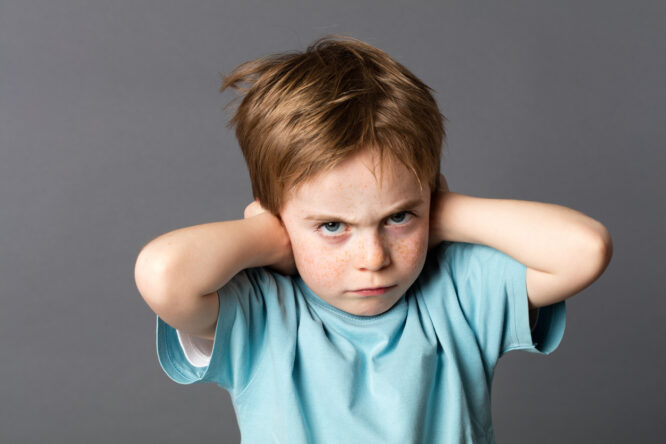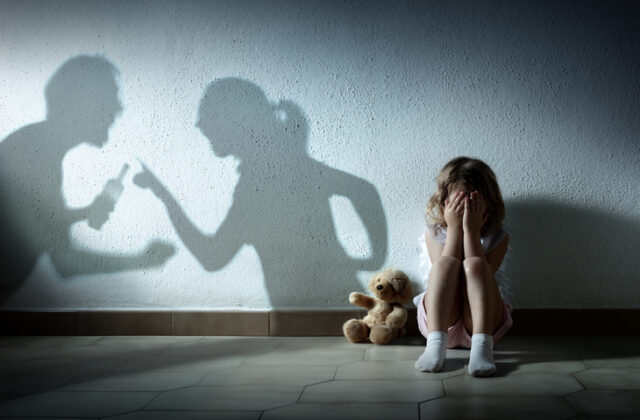Being labelled the “bad kid” growing up sticks with you in ways people don’t always realise.

Even if you weren’t truly bad—maybe you were just louder, more sensitive, or didn’t fit the mould—the story you were fed about yourself tends to inform how you move through adulthood. If you carried those old labels with you, some of these traits will probably feel a little too familiar. Try not to be too hard on yourself. If you’re doing your best, you’re doing just fine.
1. You apologise even when you didn’t do anything wrong.

Growing up feeling like the troublemaker teaches you to expect blame, even when it’s not yours to carry. So in adulthood, you might find yourself saying sorry for things that aren’t your fault, or even for just existing a little too loudly. It’s a habit that’s hard to break because it feels safer to shrink yourself first before anyone else gets the chance to criticise you. Of course, deep down, you know you’re not actually sorry—you’re just conditioned to avoid conflict.
2. You assume people are mad at you, even when they’re not.

When you were used to getting in trouble or being misunderstood, silence feels suspicious. If someone’s short with you, doesn’t text back immediately, or just seems off, your brain automatically jumps to worst-case scenarios. You replay conversations, looking for where you went wrong, even when there’s nothing there. Trusting that you’re not always the problem can feel like a whole new skill you have to consciously practice.
3. You have a complicated relationship with authority.

Being treated like the bad kid often means you grew up distrusting authority figures, or feeling like you had to either rebel against them or walk on eggshells. That tension doesn’t magically disappear when you grow up. Today, you might either bristle at being told what to do or overcompensate by becoming overly deferential. Either way, your early experiences taught you to be wary of people who hold power over you.
4. You get defensive faster than you want to.

When you’re used to being seen as the one who’s wrong, it’s hard not to brace for attack, even when no one’s coming for you. Feedback, even when it’s delivered calmly, can feel threatening instead of helpful. It’s not because you can’t take criticism—it’s because your nervous system still reacts like it’s back in the principal’s office, trying to survive the next lecture. Unlearning that knee-jerk defensiveness takes time and self-trust.
5. You expect people to misunderstand your intentions.

When you’ve spent a lifetime being misread—being seen as difficult when you were hurt, or defiant when you were scared—you naturally assume people will get you wrong again. That makes opening up feel risky. You’re used to feeling like, no matter how carefully you speak or act, people will twist it. It’s exhausting, and it makes true vulnerability feel like walking a tightrope.
6. You sometimes self-sabotage without realising it.

When you’re used to being labelled a failure or a problem, part of you might start believing you’re destined to mess things up. So even when good things happen, there’s a quiet urge to push them away before they fall apart anyway. It’s not because you don’t want success or happiness. It’s because deep down, you learned to expect disappointment. And weirdly, choosing it before it chooses you can feel safer than risking hope.
7. You crave validation, but struggle to trust it.

You want to be seen and appreciated so badly, but when someone actually compliments you or treats you with kindness, you instinctively question it. What do they want? Are they just being polite? Being misjudged so often wired you to be suspicious of good things. Letting yourself believe someone genuinely likes and values you feels almost too good to be true, even though you deeply long for it.
8. You’re hyper-aware of how much space you take up.

When you were made to feel like a disruption as a kid, you learned to shrink yourself without even thinking. You apologise for speaking up, minimise your needs, and hesitate to take up physical or emotional space. It’s not because you believe you’re unworthy. It’s because part of you still believes being seen too much equals being punished. Unlearning that requires a conscious, tender commitment to letting yourself exist fully.
9. You have a hard time believing you’re good enough.

No matter how much you accomplish, there’s often a stubborn part of you that feels like it’s never quite enough. That old narrative—that you’re fundamentally flawed—lingers long past childhood. Even when people praise you or celebrate you, it doesn’t always land. You might smile and nod, but part of you is still waiting for the moment when they figure out you’re not as good as they think.
10. You struggle with guilt even when you’ve done nothing wrong.

Feeling guilty was practically baked into your upbringing. Now, guilt shows up over the smallest things—saying no to plans, prioritising your own needs, or even just having boundaries. You carry an invisible weight that’s hard to explain to people who didn’t grow up with it. That doesn’t mean you’re reckless or inconsiderate. You’re just almost too aware of how your actions might affect other people.
11. You find it easier to expect rejection than acceptance.

Deep down, it often feels safer to assume people won’t like you or stay. That way, if it happens, you’re prepared—and if they don’t reject you, it feels like a pleasant surprise instead of a necessity. That defensive hope makes relationships feel precarious, even when they’re steady. Trusting that you can simply be liked without conditions still feels like a foreign language some days.
12. You either rebel hard, or follow rules too rigidly.

Early experiences of being punished or misunderstood often push people to one extreme or the other: either “I’ll do everything perfectly so no one can criticise me,” or “If I’m going to be blamed anyway, I might as well do what I want.” Neither extreme feels satisfying for long. Finding a middle ground—living authentically without swinging between rebellion and perfectionism—is where real freedom starts, but it’s a tough road there.
13. You second-guess even basic interactions.

Sending an email, making a request, giving an opinion—things that seem easy for everyone often leave you spiralling in overthinking. What if I upset them? What if I sounded rude? What if I asked for too much? That constant self-monitoring comes from old fears of being wrong, bad, or misunderstood. Trusting that you’re allowed to exist without endless apology is a healing process that unfolds one small moment at a time.
14. You feel like you’re always “too much” or “not enough.”

Feeling like you could never land in the right spot—too loud, too sensitive, too stubborn, too emotional—becomes a familiar ache. No matter how much you shape-shift, it feels like you’re missing some invisible mark. Learning to define yourself on your own terms, rather than through old labels, is one of the most radical things you can do. But it doesn’t happen overnight. It’s a quiet, powerful reclaiming of your story.
15. You struggle to relax around people you care about.

When you’re used to relationships feeling conditional—be good enough or else—you carry a low hum of anxiety even with people who love you. What if they change their mind? What if you mess it up? Letting your guard down, trusting that you’re safe just as you are, takes time and practice. You don’t have to force yourself to relax. You just need to learn that that real safety doesn’t require you to perform.
16. You have a quiet resilience that’s easy to overlook.

Growing up feeling like the “bad kid” might have burdened you—but it also built something solid inside you. You know how to survive hard moments, how to keep going even when you feel misunderstood, how to rebuild yourself quietly. That resilience isn’t loud or flashy. It shows up in the way you hold yourself together when no one’s watching. And even though it was forged through pain you didn’t deserve, it’s still yours, and it’s something to be deeply proud of.




